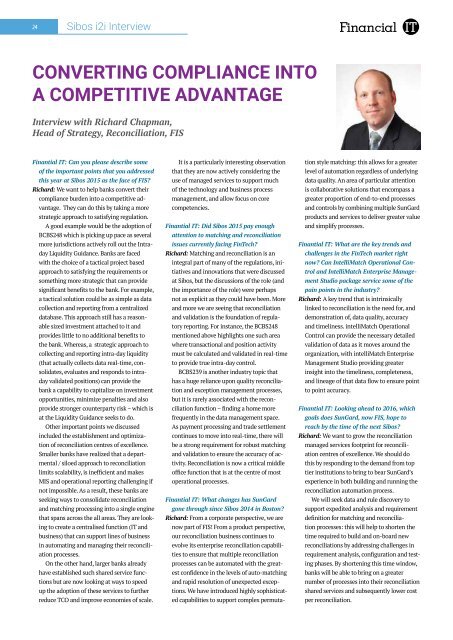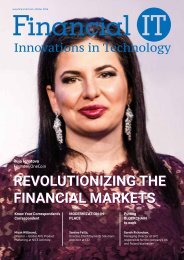Revolutionizing the Financial Markets
You also want an ePaper? Increase the reach of your titles
YUMPU automatically turns print PDFs into web optimized ePapers that Google loves.
24<br />
Sibos i2i Interview<br />
Converting compliance into<br />
a competitive advantage<br />
Interview with Richard Chapman,<br />
Head of Strategy, Reconciliation, FIS<br />
Finantial IT: Can you please describe some<br />
of <strong>the</strong> important points that you addressed<br />
this year at Sibos 2015 as <strong>the</strong> face of FIS?<br />
Richard: We want to help banks convert <strong>the</strong>ir<br />
compliance burden into a competitive advantage.<br />
They can do this by taking a more<br />
strategic approach to satisfying regulation.<br />
A good example would be <strong>the</strong> adoption of<br />
BCBS248 which is picking up pace as several<br />
more jurisdictions actively roll out <strong>the</strong> Intraday<br />
Liquidity Guidance. Banks are faced<br />
with <strong>the</strong> choice of a tactical project based<br />
approach to satisfying <strong>the</strong> requirements or<br />
something more strategic that can provide<br />
significant benefits to <strong>the</strong> bank. For example,<br />
a tactical solution could be as simple as data<br />
collection and reporting from a centralized<br />
database. This approach still has a reasonable<br />
sized investment attached to it and<br />
provides little to no additional benefits to<br />
<strong>the</strong> bank. Whereas, a strategic approach to<br />
collecting and reporting intra-day liquidity<br />
(that actually collects data real-time, consolidates,<br />
evaluates and responds to intraday<br />
validated positions) can provide <strong>the</strong><br />
bank a capability to capitalize on investment<br />
opportunities, minimize penalties and also<br />
provide stronger counterparty risk – which is<br />
at <strong>the</strong> Liquidity Guidance seeks to do.<br />
O<strong>the</strong>r important points we discussed<br />
included <strong>the</strong> establishment and optimization<br />
of reconciliation centres of excellence.<br />
Smaller banks have realized that a departmental<br />
/ siloed approach to reconciliation<br />
limits scalability, is inefficient and makes<br />
MIS and operational reporting challenging if<br />
not impossible. As a result, <strong>the</strong>se banks are<br />
seeking ways to consolidate reconciliation<br />
and matching processing into a single engine<br />
that spans across <strong>the</strong> all areas. They are looking<br />
to create a centralised function (IT and<br />
business) that can support lines of business<br />
in automating and managing <strong>the</strong>ir reconciliation<br />
processes.<br />
On <strong>the</strong> o<strong>the</strong>r hand, larger banks already<br />
have established such shared service functions<br />
but are now looking at ways to speed<br />
up <strong>the</strong> adoption of <strong>the</strong>se services to fur<strong>the</strong>r<br />
reduce TCO and improve economies of scale.<br />
It is a particularly interesting observation<br />
that <strong>the</strong>y are now actively considering <strong>the</strong><br />
use of managed services to support much<br />
of <strong>the</strong> technology and business process<br />
management, and allow focus on core<br />
competencies.<br />
Finantial IT: Did Sibos 2015 pay enough<br />
attention to matching and reconciliation<br />
issues currently facing FinTech?<br />
Richard: Matching and reconciliation is an<br />
integral part of many of <strong>the</strong> regulations, initiatives<br />
and innovations that were discussed<br />
at Sibos, but <strong>the</strong> discussions of <strong>the</strong> role (and<br />
<strong>the</strong> importance of <strong>the</strong> role) were perhaps<br />
not as explicit as <strong>the</strong>y could have been. More<br />
and more we are seeing that reconciliation<br />
and validation is <strong>the</strong> foundation of regulatory<br />
reporting. For instance, <strong>the</strong> BCBS248<br />
mentioned above highlights one such area<br />
where transactional and position activity<br />
must be calculated and validated in real-time<br />
to provide true intra-day control.<br />
BCBS239 is ano<strong>the</strong>r industry topic that<br />
has a huge reliance upon quality reconciliation<br />
and exception management processes,<br />
but it is rarely associated with <strong>the</strong> reconciliation<br />
function – finding a home more<br />
frequently in <strong>the</strong> data management space.<br />
As payment processing and trade settlement<br />
continues to move into real-time, <strong>the</strong>re will<br />
be a strong requirement for robust matching<br />
and validation to ensure <strong>the</strong> accuracy of activity.<br />
Reconciliation is now a critical middle<br />
office function that is at <strong>the</strong> centre of most<br />
operational processes.<br />
Finantial IT: What changes has SunGard<br />
gone through since Sibos 2014 in Boston?<br />
Richard: From a corporate perspective, we are<br />
now part of FIS! From a product perspective,<br />
our reconciliation business continues to<br />
evolve its enterprise reconciliation capabilities<br />
to ensure that multiple reconciliation<br />
processes can be automated with <strong>the</strong> greatest<br />
confidence in <strong>the</strong> levels of auto-matching<br />
and rapid resolution of unexpected exceptions.<br />
We have introduced highly sophisticated<br />
capabilities to support complex permutation<br />
style matching: this allows for a greater<br />
level of automation regardless of underlying<br />
data quality. An area of particular attention<br />
is collaborative solutions that encompass a<br />
greater proportion of end-to-end processes<br />
and controls by combining multiple SunGard<br />
products and services to deliver greater value<br />
and simplify processes.<br />
Finantial IT: What are <strong>the</strong> key trends and<br />
challenges in <strong>the</strong> FinTech market right<br />
now? Can IntelliMatch Operational Control<br />
and IntelliMatch Enterprise Management<br />
Studio package service some of <strong>the</strong><br />
pain points in <strong>the</strong> industry?<br />
Richard: A key trend that is intrinsically<br />
linked to reconciliation is <strong>the</strong> need for, and<br />
demonstration of, data quality, accuracy<br />
and timeliness. intelliMatch Operational<br />
Control can provide <strong>the</strong> necessary detailed<br />
validation of data as it moves around <strong>the</strong><br />
organization, with intelliMatch Enterprise<br />
Management Studio providing greater<br />
insight into <strong>the</strong> timeliness, completeness,<br />
and lineage of that data flow to ensure point<br />
to point accuracy.<br />
Finantial IT: Looking ahead to 2016, which<br />
goals does SunGard, now FIS, hope to<br />
reach by <strong>the</strong> time of <strong>the</strong> next Sibos?<br />
Richard: We want to grow <strong>the</strong> reconciliation<br />
managed services footprint for reconciliation<br />
centres of excellence. We should do<br />
this by responding to <strong>the</strong> demand from top<br />
tier institutions to bring to bear SunGard’s<br />
experience in both building and running <strong>the</strong><br />
reconciliation automation process.<br />
We will seek data and rule discovery to<br />
support expedited analysis and requirement<br />
definition for matching and reconciliation<br />
processes: this will help to shorten <strong>the</strong><br />
time required to build and on-board new<br />
reconciliations by addressing challenges in<br />
requirement analysis, configuration and testing<br />
phases. By shortening this time window,<br />
banks will be able to bring on a greater<br />
number of processes into <strong>the</strong>ir reconciliation<br />
shared services and subsequently lower cost<br />
per reconciliation.







